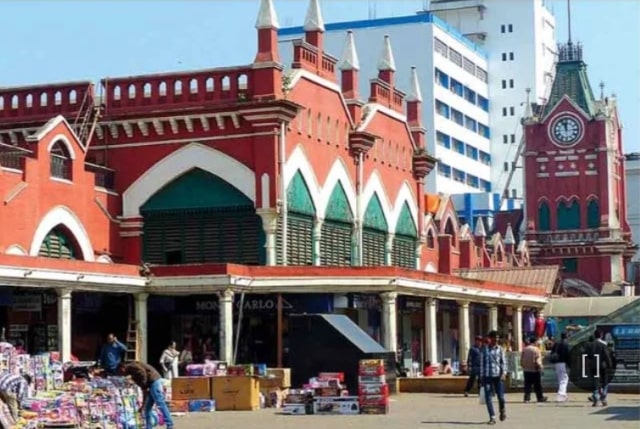
Kolkata’s Mini Bangladesh Feels The Pinch
People in this subcontinent, except for a miniscule, will be pining for the food they are eating all the time at home as they make a trip abroad instead of trying the local fare. Take the case of Bangladeshis, who before prime minister Sheikh Hasina was forced to leave Dhaka a little over a year ago following student led upheavals, would always be in Kolkata in hundreds as tourists must eat food here cooked in the same way back home. Let this be made clear at the outset. Like Bengalis on the two sides of the border will sound differently while speaking the same language – it will be pronouncedly so if they are from Chittagong or Sylhet – the cuisines too have their distinct identity.
For the benefit of readers not familiar with the above kind of distinction, in the local lingo you have ‘Bangal’ who either live in Bangladesh or who trace their origin there and ‘Ghoti’ who hail from West Bengal. Bengalis irrespective of where they are from have rice and fish, the latter thanks to the rivers, including the Padma and the Ganga crisscrossing the land, as their staple food. But Dhaka being once the Mughal capital of Bengal Subah and a major trading centre, foreign culinary naturally left a mark in the food there. Then the Nawabs of Dhaka introduced Nawabi (a form of Mughlai) cuisine to be further embellished by Persian, Turkish and Arabic influences when East Bengal was part of Pakistan.
A chef at Kasturi restaurant in Kolkata (you have a famous Kasturi in Dhaka too which tourists, epicurean kind from here will never give a miss) says: “In selection and use of spices, in sauteing, the Bangladeshi cuisine is distinctively different from ours. While retaining the basics of East Bengali food, the Bangladeshi fare has well absorbed mostly Islamic influences. I think from the patronisation we received from Bangladeshi tourists before that country faced political upheavals last year would confirm that our food was up to their palate.”
Unarguably Kasturi has always been the first choice for food for visitors from Bangladesh. At the same time, among the other well patronised eateries are Radhuni, Aami Bangali and Dhansiri at what is lovingly described as ‘mini Bangladesh’ encasing large portions of Marquis Street, Kyd Street, Rafi Ahmed Kidwai Road and Free School Street.
In days preceding Sheikh Hasina’s escape to Delhi, the ‘mini Bangladesh,’ which besides many eateries and home food delivery outlets houses hotels, guest houses, travel agencies and foreign exchange centres was an ever-bustling centre with teeming Bangladeshis. Over the years, the Bangladeshis have become the principal patrons of shops at the century and a half old iconic New Market. A shop owner there dealing in textiles and readymade garments says while New Market has long ceased to be the preferred shopping destination for the local residents, thanks to the opening of a number of high-end malls, the loss of this patronage was largely made good by highly indulgent shopping by the Bangladeshis.
ALSO READ: Dhaka Disorder – An Year Later
Whatever the reason for travel to Kolkata, business, medical or simply tourism, the Bangladeshis have the reputation to splurge money on buying sarees, dresses, jewellery and what have you. As it would happen, the economy of ‘mini Bangladesh’ and transactions in New Market became so largely dependent on tourists from the neighbouring country that their near total absence for a year resulting from visas being made available on a highly restrictive basis has sounded the death knell for many establishments.
Remember, all tourists from Bangladesh are not necessarily of modest means. The well-heeled ones used to check in at premier hotels, savour food and drinks at posh restaurants in the city and shop at exclusive outlets. These establishments too have taken a hit, but not to the same extent as the ones in ‘mini Bangladesh’. If you will call this an enclave, it houses over 200 hotels and guest houses and nearly 3,000 shops, all seeing their business plummet to disastrously low since July last year coinciding with the outburst of student agitation against Awami League administration policy on quotas in government jobs. The movement first surreptitiously and then openly was backed by Islamist forces. According to the UN Human Rights Commission, which collected information from various credible sources, the 2024 July-August crackdown could have claimed ‘up to 1,400’ lives.
Unfortunately, the new dispensation led by Dr Mohammad Yunus, a sworn enemy of Sheikh Hasina, in its pursuit of cordiality with China and Pakistan has soured relationship with India, leading to two-way visa restrictions. The present low-point of relationship between the two neighbours has virtually extinguished tourist arrivals from Bangladesh (in sunnier days in 2023 that country had a 22 per cent share of foreign tourist arrivals in India) causing serious collateral damage to not only to tourism infrastructure in Kolkata dedicated to Bangladeshis but also to a number of hospitals in the city. Incidentally, since the emergence of Bangladesh as an independent country in 1971, its citizens have routinely travelled to Kolkata for medical care.
Over the years, the numbers of medical tourists grew to an extent that leading hospitals in the city, including Apollo, Peerless, RN Tagore Hospital and Amri opened special windows for the Bangladeshis. The preference for treatment in Kolkata has a few compelling reasons, including high class medical facilities, cost affordability and proximity. To their utter disappointment, the Bangladeshi patients are now finding it difficult to secure medical visas to travel to Kolkata. As a result, at the outpatient departments of Kolkata hospitals, visits by the Bangladeshis are down to 10 to 15 per cent of the routine flow ahead of July 2024.
The wait for medical care in Kolkata becoming longer because of political standoff between the two neighbours, the more affluent Bangladeshis are seeking relief in Singapore. While visas are now very selectively given to medical tourists from Bangladesh, the veterinary clinics in Kolkata continue to draw a blank when it comes to entertaining pet parents from the neighbouring country. The local demand for medical services has been so strong that private hospital chains are able to absorb the loss of custom from Bangladesh.
But hotels and guest houses, shops and restaurants, travel agencies and foreign exchange dealers who have always almost exclusively depended on Bangladeshi patronage are seeing their losses mounting everyday with quite a few shuttering their establishments. Absence of Bangladeshis means daily loss of business of anything between ₹3 crore and ₹5 crore in mini Bangladesh alone. The loss goes up by several notches if account is taken of purchases the Bangladeshis used to make in good times in the wholesale market of Burra bazar and several other marketing centres in Kolkata.



